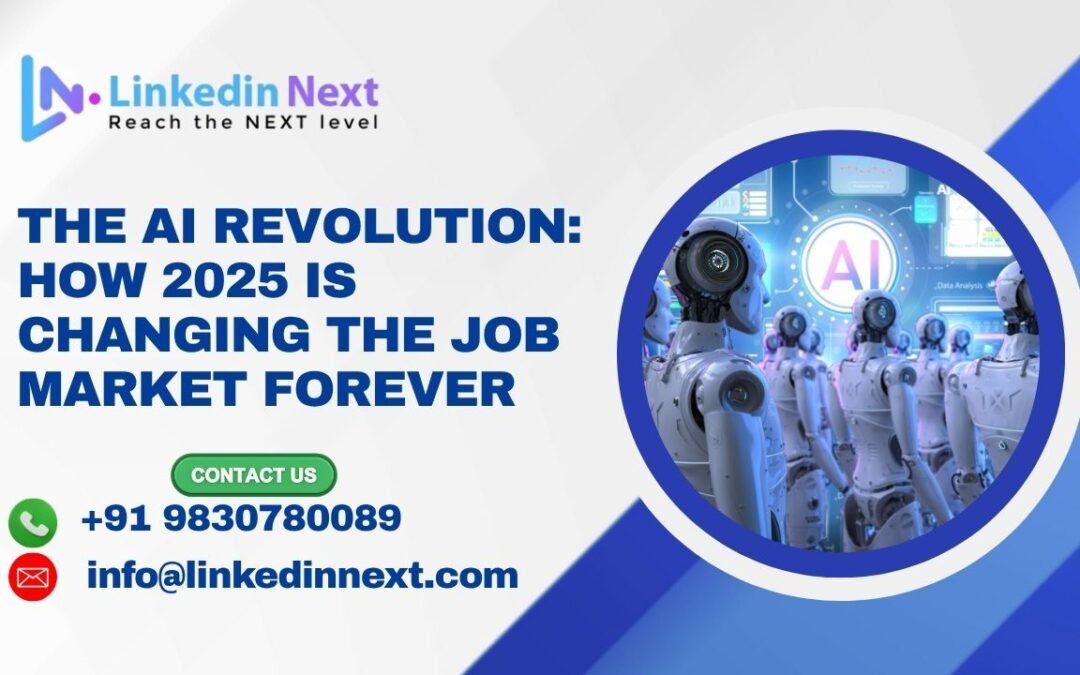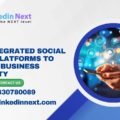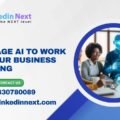The AI Revolution: How 2025 Is Changing the Job Market Forever
The AI Revolution: How 2025 Is Changing the Job Market Forever. The year 2025 marks a defining chapter in the global workforce. Artificial Intelligence (AI) has evolved from a futuristic concept into a transformative force that is reshaping industries, redefining careers, and revolutionizing the skills economy. As automation and intelligent systems become increasingly capable, the job market of 2025 stands at a crossroads — a convergence of technology, innovation, and human adaptability.
The Dawn of the AI-Driven Workforce
AI has rapidly advanced beyond simple task automation. In 2025, machine learning, generative AI, and robotics have penetrated nearly every sector — from healthcare and finance to education and creative industries. This shift has restructured traditional job roles, compelling businesses and professionals alike to rethink how work is done.
Companies are now relying on AI-powered decision-making, predictive analytics, and smart algorithms that enhance productivity and accuracy. Routine administrative roles, data entry positions, and even basic customer service functions have seen widespread automation. However, this evolution has also created entirely new job categories, such as AI trainers, data ethicists, and automation analysts, signaling a major paradigm shift in employment trends.
Industries Transformed by Artificial Intelligence
1. Healthcare: From Diagnostics to Predictive Care
AI in healthcare has revolutionized patient outcomes and operational efficiency. Intelligent systems can now detect diseases at early stages, analyze imaging scans faster than human doctors, and predict patient risks based on big data. Roles in AI-driven medical research, bioinformatics, and telemedicine development are emerging, demanding a new wave of hybrid professionals who understand both technology and medical science.
2. Finance: The Rise of Algorithmic Decision-Making
The financial sector has witnessed an unprecedented transformation through AI algorithms, blockchain integration, and robo-advisors. These tools analyze vast datasets to forecast market trends, automate trading, and enhance fraud detection. As a result, professionals in finance are shifting towards AI analytics, cybersecurity, and fintech product innovation.
3. Manufacturing: Smart Factories and Robotics
AI-powered automation has redefined manufacturing processes. Smart factories utilize predictive maintenance systems and robotic assembly lines to achieve maximum efficiency and minimal downtime. While traditional assembly line jobs are declining, new opportunities in robotic engineering, AI maintenance, and process optimization are rising exponentially.
4. Education: Personalized Learning with AI Tutors
In 2025, the education landscape is no longer confined to textbooks. AI-driven platforms provide personalized learning experiences, assessing individual strengths and weaknesses. Educators are embracing AI tools to craft adaptive lesson plans, while AI curriculum designers and digital pedagogy experts are now critical roles in modern academia.
5. Retail and Customer Experience: Hyper-Personalization
Retailers are leveraging AI-driven recommendation engines and predictive shopping experiences to enhance customer satisfaction. From chatbots to virtual try-on technology, AI in e-commerce is setting new standards for personalization. Professionals in this domain are now required to master consumer data analytics, AI-based marketing, and customer behavior prediction.
The Changing Landscape of Employment
The Rise of AI-Augmented Jobs
Contrary to the fear of mass unemployment, AI has given rise to augmented roles where humans and machines collaborate. Professions such as AI-assisted architects, content creators using generative AI, and precision agriculture specialists highlight the growing trend of co-intelligence — the synergy between human creativity and machine efficiency.
New Skills for the AI Era
The job market now values skills over degrees. Employers prioritize candidates who possess AI literacy, data analysis capabilities, and critical thinking. The demand for prompt engineering, neural network optimization, and ethical AI development is skyrocketing. Educational institutions and online learning platforms are rapidly integrating AI upskilling programs to bridge the talent gap.
Remote Work and AI Collaboration Tools
The post-pandemic work culture continues to thrive, with AI collaboration tools revolutionizing remote work. Intelligent project management systems, automated reporting dashboards, and virtual assistants have become integral to organizational success. AI now monitors productivity, predicts team burnout, and suggests workflow optimizations, making work environments more efficient and human-centric.
The Ethical Dilemma: Balancing Automation with Humanity
As AI systems gain autonomy, the debate around ethics and job displacement has intensified. Governments and corporations are now implementing AI governance frameworks to ensure responsible usage. The challenge lies in maintaining a balance between technological advancement and social equity.
AI bias, data privacy, and algorithmic transparency are at the forefront of global discussions. Ethical AI experts are increasingly sought after to audit algorithms and ensure fairness across automated systems. This has given rise to new positions in AI compliance, governance, and digital ethics, emphasizing the need for moral intelligence in technological ecosystems.
Entrepreneurship in the Age of Artificial Intelligence
AI has also unleashed a new era of entrepreneurial innovation. Startups are harnessing AI to develop smart applications, predictive tools, and digital assistants tailored for niche markets. Entrepreneurs now leverage AI-driven market analysis to identify trends, optimize business operations, and scale globally with minimal resources.
Moreover, the gig economy has expanded with AI-powered platforms connecting freelancers to clients more efficiently. Professionals who master AI-based tools such as content generators, design assistants, and automation frameworks are commanding higher incomes and creative autonomy.
The Future of Work: Collaboration Over Competition
The AI revolution is not about replacing humans but redefining human potential. In 2025, the most successful organizations are those embracing collaboration between AI and human intelligence. Instead of fearing obsolescence, workers are learning to leverage AI as a partner — one that amplifies creativity, precision, and decision-making power.
AI has become a catalyst for inclusivity, offering equal opportunities through remote access, assistive technologies, and unbiased recruitment processes. The next wave of employment will focus on human empathy, emotional intelligence, and strategic thinking — skills that machines cannot replicate.
Conclusion: The Workforce of Tomorrow Begins Today
The AI revolution of 2025 is not a threat — it’s a transformation. It demands adaptability, continuous learning, and an open mindset. Those who embrace AI as an ally will find themselves at the forefront of innovation and progress. The future belongs to those who can blend technology with humanity, creating a symbiotic relationship that drives both economic growth and social advancement.
As we stand on the threshold of this digital revolution, one thing is clear: AI will not replace humans — but humans who use AI will replace those who do not.
Also read our more BLOG here.
Thank you for read our blog “The AI Revolution: How 2025 Is Changing the Job Market Forever”.
I hope this blog is helpful to you, if you have any question feel free contact us at
Call/WhatsApp: +91.9830780089 || Email: info@linkedinnext.com







Recent Comments